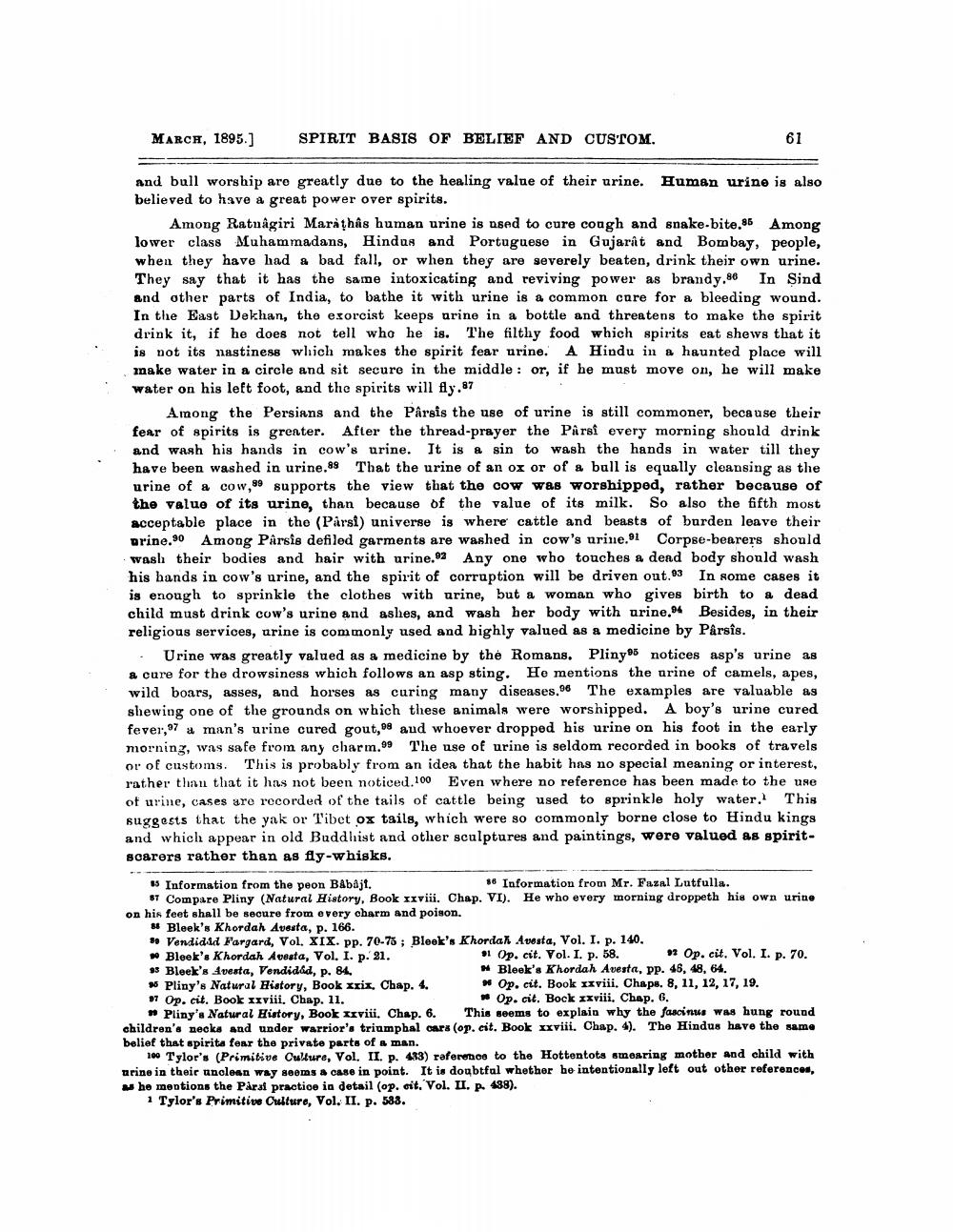________________
MARCH, 1895.]
SPIRIT BASIS OF BELIEF AND CUSTOM.
67
and bull worship are greatly due to the healing value of their urine. Human urine is also believed to have a great power over spirits.
Among Ratnagiri Marathas human urine is used to cure cough and snake bite.86 Among lower class Muhammadans, Hindus and Portuguese in Gujarât and Bombay, people, when they have had a bad fall, or when they are severely beaten, drink their own urine. They say that it has the same intoxicating and reviving power as brandy.86 In Sind and other parts of India, to bathe it with urine is a common care for a bleeding wound. In the East Dekhan, the exorcist keeps urine in a bottle and threatens to make the spirit drink it, if he does not tell who he is. The filthy food which spirits eat shews that it is not its nastiness which makes the spirit fear urine. A Hindu in a haunted place will make water in a circle and sit secure in the middle : or, if he must move on, he will make water on his left foot, and the spirits will fly.87
Among the Persians and the Pârsis the use of urine is still commoner, because their fear of spirits is grenter. After the thread-prayer the Pårs every morning should drink and wash his hands in cow's urine. It is a sin to wash the hands in water till they have been washed in urine.89 That the urine of an ox or of a ball is equally cleansing as the urine of a cow,89 supports the view that the cow was worshipped, rather because of the value of its urine, than because of the value of its milk. So also the fifth most acceptable place in the (Parsi) universe is where cattle and beasts of burden leave their prine.90 Among Parsis defiled garments are washed in cow's urine.91 Corpse-bearers should wash their bodies and hair with urine.92 Any one who touches a dead body should wash his hands in cow's urine, and the spirit of corruption will be driven out.03 In some cases it is enough to sprinkle the clothes with urine, but a woman who gives birth to a dead child must drink cow's urine and ashes, and wash her body with urine. Besides, in their religious services, urine is commonly used and highly valued as a medicine by Pårsîs.
· Urine was greatly valued as a medicine by the Romans. Pliny notices asp's urine as a cure for the drowsiness which follows an asp sting. He mentions the urine of camels, apes, wild boars, asses, and horses as curing many diseases.96 The examples are valuable as shewing one of the grounds on which these animals were worshipped. A boy's urine cured fever, 97 a man's urine cured gout, and whoever dropped his urine on his foot in the early morning, was safe from any charm.99 The use of urine is seldom recorded in books of travels or of customs. This is probably from an idea that the habit has no special meaning or interest, rather than that it has not been noticed 100 Even where no reference has been made to the use of urine, cases are recorded of the tails of cattle being used to sprinkle holy water. This suggests that the yak or Tibet ox tails, which were so commonly borne close to Hindu kings and which appear in old Buddhist and other sculptures and paintings, were valued as spiritsoarers rather than as fly-whisks.
15 Information from the peon BAbajt.
$8 Information from Mr. Fazal Lutfulla. 87 Compare Pliny (Natural History, Book xxviii. Chap. VI). He who every morning droppeth his own urine on his feet shall be secure from every charm and poison.
# Bleek's Khordah Avesta, p. 166. So Vendidid Fargard, Vol. XIX. pp. 70-75; Bleek's Khordal Avesta, Vol. I. p. 140. • Bleek's Khordah Avesta, Vol. I. p. 21.
91 Op. cit. Vol. I. p. 58. " Op. cit. Vol. I. p. 70. 93 Bleek's Avesta, Vendidád, p. 84,
# Bleek's Khordah Avesta, pp. 46, 48, 64. * Pliny's Natural History, Book xxix, Chap. 4.
Op. cit. Book xxviii. Chaps. 8, 11, 12, 17, 19. 97 Op. cit. Book xxviii. Chap. 11.
* Op. cit. Bock xxviii. Chap. 6. + Pliny's Natural History, Book II viii. Chap. 6. This seems to explain why the fascinus was hung round children's necks and under warrior's triumphal oars (op. cit. Book xxviii. Chap. 4). The Hindus have the same belief that spirits fear the private parts of a man.
100 Tylor's (Primitive Culture, Vol. II. p. 483) reference to the Hottentots smearing mother and child with urine in their unclean way seems a case in point. It is doabtful whether he intentionally left out other references, w he mentions the Pårai practice in detail (op. cit. Vol. II. p. 438).
1 Tylor's Primitive Culture, Vol. II. p. 533.




